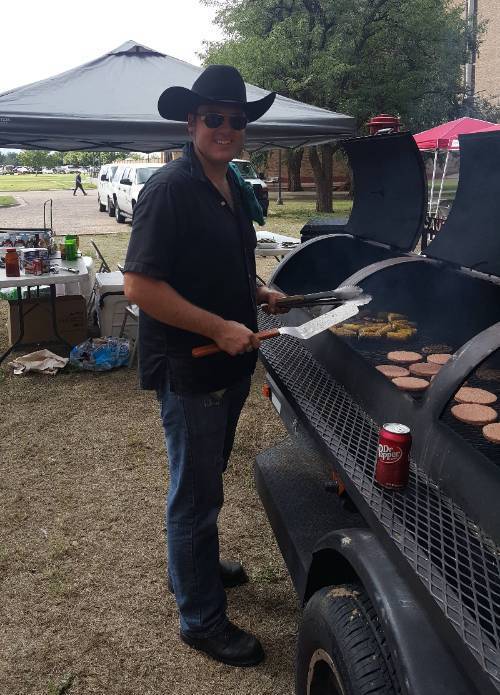Focus on Postdoctoral Research Fellow: Ra Inta
Postdoctoral Research Fellow, TTU Physics and Astronomy
A native of New Zealand, Dr. Ra Inta received his B.Sc. (Honours) in Physics from the University of Canterbury (New Zealand) and his Ph.D. in Physics from University of New South Wales (UNSW). The title of his PhD project was “The Acoustics of the Steel-String Guitar,” and he readily admits that this was every bit as fun as it sounds. While working on the project at the Music Acoustics Laboratory of UNSW, he actually learned how to make guitars.
His current work involves the vibrations of space-time, known as gravitational waves, as part of the Laser Interferometer Gravitational-Wave Observatory (LIGO) collaboration (www.ligo.org). Inta describes it as “acoustics in space.” He is also interested in advanced signal processing methods, particularly those related to sparse methods, and enjoys playing with computers and constructing novel computing systems.
He is working with Dr. Benjamin Owen while at Texas Tech, and the two have recently looked for continuous gravitational waves from nine young supernova remnants in LIGO's Sixth Science Run (S6) (www.ligo.org/science/Publication-S6DirectedSNR/).
The preceding paragraphs succinctly describe the creative and complex work that consumes the professional life of Inta, but they don't begin to describe his unique biography—a life story that is so richly textured and improbable that it could have been written by Tom Robbins, or perhaps Saul Bellow.
Inta (the surname is Lithuanian) is the child of two free spirits who met in New Zealand during the 1975 Maori land march. Inta's blonde, blue-eyed mother was playing a flute during the march, and his father, nicknamed “Hairy Scotty” by his aborigine friends, soon began a nomadic life together, trekking throughout the West Coast of New Zealand's South Island and living off the land. Inta was born in a hut by the light of a campfire, his young father the only attendant. His mother became an environmental activist in New Zealand, while his father lives in a mountain valley commune and still reads by candlelight. Although his upbringing was anything but conventional, Inta credits his parents with giving him an interest in science and a love for music. He also credits some really great teachers who took the time to mentor the smart “hippie kid” whose hero was Albert Einstein and whose dream was to become an astronaut one day.
Inta met his wife, Beth Koehn, at a barbecue in Australia. Koehn is an opera singer originally from Texas, but at the time they met she was in Australia studying the reproductive biology of tammar wallabies. After a long courtship, Inta came to the U.S. with Koehn and in 2008 they were married in Las Vegas by an Elvis impersonator. Today, they are happily installed in Lubbock while Inta completes his postdoctoral research. Their family consists of two dogs, a Staffie named Otis that they acquired in Australia, and a stray, mixed breed “chupacabra” named Django that encountered Inta and Otis while they were out walking in their neighborhood park and refused to leave their side. Django will go back with them to Australia when they return.
Your home in New Zealand is one of the greenest places on earth. What was it like moving to West Texas?
Almost a polar opposite! The mountains go straight down into the sea where I grew up. And we measure the rainfall in metres per year. However, I lived in Australia for quite a while, and the West Texas region resembles the Outback in many ways.
What is your favorite thing about Texas Tech in general and the Physics Department in particular?
People, people, people. We have some great people at Tech and in the Physics Department. But I also really like the multifarious musical activities—many of which I can't believe are free!
Graham Greene wrote, “There is always one moment in childhood when the door opens and lets the future in.” Can you identify this moment from your childhood?
When I was four, I wanted to be a fire engine driver. Then my mother put me on a five-cent ‘spaceship' ride. After that, I wanted to be an astronaut and assumed you had to be a scientist to be so. I soon discovered that astronauts had to basically just do as they're told. But the scientist part stayed.
You were a very curious child. What role did your childhood curiosity play in your choice of career?
Well, I guess you don't last long in a factory asking questions incessantly! I would (and still do) talk to anyone and ask lots of questions. A childlike curiosity is a necessary ingredient for a scientist. Nature doesn't care how good your process or expectations are: you have to be brutally honest when questioning her.

International Affairs
-
Address
601 Indiana Avenue, Lubbock, TX 79409-5004 -
Phone
806.742.3667 -
Email
oia.reception@ttu.edu
